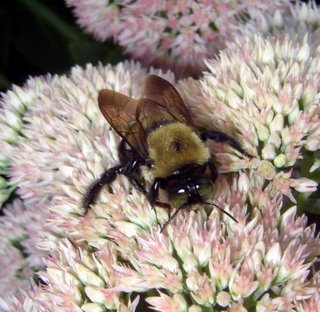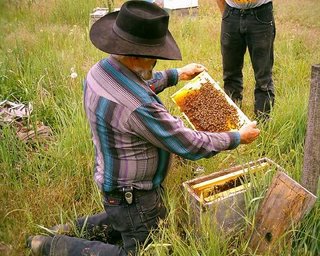bees
Today, for no special reason, I've decided to talk a bit about bees. The picture below I took of a bee that was snacking on some flowers next to my porch. That was last September. He didn't seem to mind me taking the picture.

The reason bees are on my mind today is that I just read a short article on honeybees in a monthly newsletter I get in the mail that focuses on agriculture in North Carolina. Apparently NC produces $10 million a year in honey but the big money is in pollination services where the honeybee industry takes in $100 million a year.
The reason that there's such a spread in those two numbers is a little sad. Apparently over the past 20 years most of the wild honeybees in the USA have been killed off by two different species of parasitic mites. These mites have also reducted the domestic honeybee population by nearly half--but now those domestic bees are needed by agriculture to pollinate crops. For most honey producers in NC, the fees they generate by renting out bees to pollinate far outpace the money they make by selling honey. Weird, huh?
 I remember when I grew up--and yes, that was a long, long time ago--there were bees all over the place. You'd constantly see them on clover and flowers. Now that one I photographed above is apparently a rare feral (wild) honeybee or someone nearby is keeping some domestic hives. I didn't see a collar on the beast...
I remember when I grew up--and yes, that was a long, long time ago--there were bees all over the place. You'd constantly see them on clover and flowers. Now that one I photographed above is apparently a rare feral (wild) honeybee or someone nearby is keeping some domestic hives. I didn't see a collar on the beast...
According to the article, not all crops need honeybees for pollination. However many of the ones that don't require insect pollination do much better with with insect pollination. For example, blueberries are 50-80% more productive if honeybees are used. Since blueberries are a $32 million crop in NC--there's a lot of incentive for a farmer to rent bees. Weird as that sounds to me. Some crops really need insects to pollinate--for example, cucumbers are 90% reliant on external insect pollination.
The article went on to mention that almonds are 100% reliant on honeybees for pollination but since they don't grow in NC, some beekeepers are planning on trucking their hives to CA for the 3 week pollination window there. The hives rent for $125 a hive there whereas here in NC the typical rental is $30-50. My first thought when I read that was I didn't want to be the one to open the doors on that truck after driving those bees 3,000 miles. Talk about being pissed off!

The reason bees are on my mind today is that I just read a short article on honeybees in a monthly newsletter I get in the mail that focuses on agriculture in North Carolina. Apparently NC produces $10 million a year in honey but the big money is in pollination services where the honeybee industry takes in $100 million a year.
The reason that there's such a spread in those two numbers is a little sad. Apparently over the past 20 years most of the wild honeybees in the USA have been killed off by two different species of parasitic mites. These mites have also reducted the domestic honeybee population by nearly half--but now those domestic bees are needed by agriculture to pollinate crops. For most honey producers in NC, the fees they generate by renting out bees to pollinate far outpace the money they make by selling honey. Weird, huh?
 I remember when I grew up--and yes, that was a long, long time ago--there were bees all over the place. You'd constantly see them on clover and flowers. Now that one I photographed above is apparently a rare feral (wild) honeybee or someone nearby is keeping some domestic hives. I didn't see a collar on the beast...
I remember when I grew up--and yes, that was a long, long time ago--there were bees all over the place. You'd constantly see them on clover and flowers. Now that one I photographed above is apparently a rare feral (wild) honeybee or someone nearby is keeping some domestic hives. I didn't see a collar on the beast...According to the article, not all crops need honeybees for pollination. However many of the ones that don't require insect pollination do much better with with insect pollination. For example, blueberries are 50-80% more productive if honeybees are used. Since blueberries are a $32 million crop in NC--there's a lot of incentive for a farmer to rent bees. Weird as that sounds to me. Some crops really need insects to pollinate--for example, cucumbers are 90% reliant on external insect pollination.
The article went on to mention that almonds are 100% reliant on honeybees for pollination but since they don't grow in NC, some beekeepers are planning on trucking their hives to CA for the 3 week pollination window there. The hives rent for $125 a hive there whereas here in NC the typical rental is $30-50. My first thought when I read that was I didn't want to be the one to open the doors on that truck after driving those bees 3,000 miles. Talk about being pissed off!

Comments
Lois Lane
I actually read that article in USA Today, but it was specific to national agriculture, not just in NC. Perhaps restaurants will stop serving honey? It doesn't bode well for our long term agriculutral industry. If there are only certain windows for polination throughout the US for various crops, and a limited supply of bees, bee services will be increasingly in demand. What the USA Today article also said was that with the rising fees for bee services, some farms won't be able to afford to contract for the services, resulting in them having to sell their farms if yields drop. I find it rather incredible that a farmer couldn't afford $150 for bees to pollinate his crops, but I guess farming is still a tough industry with some very slim margins.
Diane, I was thoughtless. My apologies. I should have been more solitious of your feelings--especially today, the day when your short tresses are all going to be cut off. Good luck with that, Diane!
We never did get any honey out of it :)
Michele sent me back !
Here from Michele